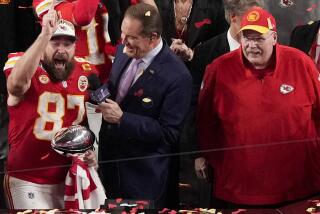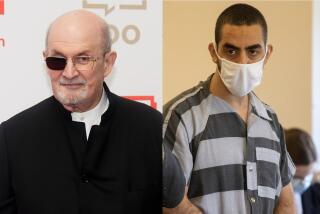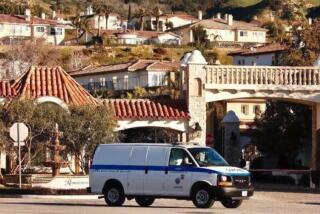Judge OKs Shoe-Bomb Suspect’s Interrogation as Trial Evidence
- Share via
WASHINGTON — A federal judge in Boston ruled Thursday that allegedly self-incriminating statements made by Richard C. Reid can be used in his trial this fall.
It was a significant victory for prosecutors, who hope to show that the Muslim militant confessed to attempting to ignite explosives hidden in his shoes to bring down a crowded airliner over the Atlantic Ocean.
Judge William G. Young denied assertions by Reid’s defense lawyers that their client was improperly interrogated after the Dec. 22 incident, and he said sedatives administered to the British citizen after he was subdued on board the plane did not influence him in deciding to speak to FBI agents.
Because the statements are central to the government’s case, the judge’s order is one of the most important rulings in preparation for the Reid trial, set to begin Nov. 4. In earlier court papers, prosecutors have said Reid acknowledged his failure to blow up the jetliner. He also allegedly told federal agents that he knew his mission would mean either “death or jail” for him.
If convicted and given the maximum punishment, Reid could spend the rest of his life in prison for attempting to kill the 197 passengers and crew members aboard American Airlines Flight 63 from Paris to Miami.
Reid was subdued by passengers and crew members after a flight attendant smelled smoke and said it appeared that he was trying to set his sneakers on fire. The flight, which was over the Atlantic at the time, was diverted to Boston.
The plane landed at Logan International Airport before 1 p.m. and four Massachusetts state police officers boarded the aircraft, handcuffed Reid and removed him, the judge’s ruling noted.
Reid was read his Miranda rights against self-incrimination, and then placed inside a police cruiser, the judge said.
Trooper Louis Santiago drove him to the police lockup at the airport and along the way attempted to strike up a conversation, the judge said.
The trooper asked Reid his name, and Reid “replied that his name could be taken from his passport.”
The trooper asked Reid where he was from, “to which Reid stated ‘Europe,’ ” the judge said.
The judge added: “At some point while in the cruiser, Trooper Santiago also asked Reid, ‘What happened on the plane?’ which Reid answered by stating that nothing happened on the plane.
“Reid then asked Trooper Santiago, ‘Where are the reporters?’ Trooper Santiago answered that there were no reporters because this was ‘not going to be a big deal.’ ”
Reid continued to ask about the news media, the judge said, and he “eventually became indignant” and stated, “ ‘You’ll see. This will be a big deal.’ ”
At that point, the judge noted, Reid said: “I have nothing else to say.”
An hour later, at the police lockup, Reid was again given a Miranda warning, the judge said. There he rested and was provided water.
Reid had earlier been forcibly medicated on the plane to calm him down, and emergency medical technicians at the police lockup noticed that his blood pressure was elevated and his pulse low. Medical technicians suggested he be hospitalized, but agents proceeded to try to interview Reid further.
At 5 p.m. that day, Reid was again read his Miranda protections and spoke with investigators for 2 1/2 hours.
“Reid answered many questions but declined to answer several others,” the judge said.
The next day, he was again read a Miranda warning and again agreed to talk with authorities.
Each time, the judge ruled, Reid was not forced to cooperate. “The police scrupulously honored Reid’s right to cut off questioning,” the judge said.
Defense attorneys in Boston could not be reached for comment.
Prosecutors have said that Reid, in his conversations with the FBI, said he wanted to blow up the flight because he was angry over the U.S. war in Afghanistan.
More to Read
Sign up for Essential California
The most important California stories and recommendations in your inbox every morning.
You may occasionally receive promotional content from the Los Angeles Times.











